 W
WAsian American literature is the body of literature produced in the United States by writers of Asian descent. Asian American literature became a category during the 1970s but didn't see a direct impact in viewership until later in the 1970s. Perhaps the earliest references to Asian American literature appeared with David Hsin-fu Wand's Asian American Heritage: An Anthology of Prose and Poetry, published in 1974. One of the earlier pieces of Asian American literature produced by Combined Asian Resources Project (CARP) was Aiiieeeee! An Anthology of Asian-American Writers (1974). This anthology collected staples of long-forgotten Asian American literature and criticized the lack of visibility of this literature. This anthology brought to light the necessity of visibility and criticism of Asian American literature; with visibility came recognition of new literature. Elaine Kim's seminal book of criticism, Asian American Literature: An Introduction to the Writings and Their Social Context, was published in 1982 and was the first critical book on the topic.
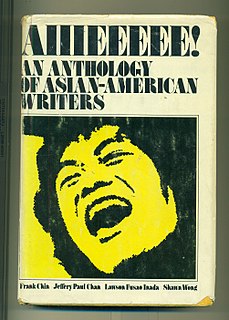 W
WAiiieeeee! An Anthology of Asian-American Writers is a 1974 anthology by Frank Chin, Jeffery Paul Chan, Lawson Fusao Inada, and Shawn Wong, members of the Combined Asian American Resources Project (CARP). It helped establish Asian American Literature as a field by recovering and collecting representative selections from Chinese-, Japanese-, and Filipino-Americans from the past fifty years—many of whom had been mostly forgotten. This pan-Asian anthology included selections from Carlos Bulosan, Diana Chang, Louis Chu, Momoko Iko, Wallace Lin, Toshio Mori, John Okada, Oscar Peñaranda, Sam Tagatac, Hisaye Yamamoto, Wakako Yamauchi, many of whom are now staples in Asian American literature courses. Because of this anthology and the work of CARP, many of these authors have been republished; at that time, however, they received little attention from publishers critics because they didn't subscribe to popular stereotypes but depicted what Elaine H. Kim calls the "unstereotyped aspects of Asian American experience". The "aiiieeeee!" of the title comes from a stereotypical expression used by Asian characters in old movies, radio and television shows, comic books, etc. These same stereotypes affected the anthology itself: when the editors tried to find a publisher, they had to turn to a historically African-American press because, as Chin states:The blacks were the first to take us seriously and sustained the spirit of many Asian American writers.... [I]t wasn't surprising to us that Howard University Press understood us and set out to publish our book with their first list. They liked our English we spoke [sic] and didn't accuse us of unwholesome literary devices.
 W
WAngry Little Girls is a webcomic by Lela Lee. The comic was launched by 2000 and is based on Lee's animated series, Angry Little Asian Girl. It challenges gender and racial stereotypes. The main character of is 6-year-old Kim, an angry Korean American girl.
 W
WThe Asian American Writers' Workshop is a nonprofit literary arts organization founded in 1991 to support Asian American writers, literature and community. The Workshop also offers the annual Asian American Literary Awards and sponsors Page Turner: The Asian American Literary Festival.
 W
WAiiieeeee! An Anthology of Asian-American Writers is a 1974 anthology by Frank Chin, Jeffery Paul Chan, Lawson Fusao Inada, and Shawn Wong, members of the Combined Asian American Resources Project (CARP). It helped establish Asian American Literature as a field by recovering and collecting representative selections from Chinese-, Japanese-, and Filipino-Americans from the past fifty years—many of whom had been mostly forgotten. This pan-Asian anthology included selections from Carlos Bulosan, Diana Chang, Louis Chu, Momoko Iko, Wallace Lin, Toshio Mori, John Okada, Oscar Peñaranda, Sam Tagatac, Hisaye Yamamoto, Wakako Yamauchi, many of whom are now staples in Asian American literature courses. Because of this anthology and the work of CARP, many of these authors have been republished; at that time, however, they received little attention from publishers critics because they didn't subscribe to popular stereotypes but depicted what Elaine H. Kim calls the "unstereotyped aspects of Asian American experience". The "aiiieeeee!" of the title comes from a stereotypical expression used by Asian characters in old movies, radio and television shows, comic books, etc. These same stereotypes affected the anthology itself: when the editors tried to find a publisher, they had to turn to a historically African-American press because, as Chin states:The blacks were the first to take us seriously and sustained the spirit of many Asian American writers.... [I]t wasn't surprising to us that Howard University Press understood us and set out to publish our book with their first list. They liked our English we spoke [sic] and didn't accuse us of unwholesome literary devices.
 W
WAiiieeeee! An Anthology of Asian-American Writers is a 1974 anthology by Frank Chin, Jeffery Paul Chan, Lawson Fusao Inada, and Shawn Wong, members of the Combined Asian American Resources Project (CARP). It helped establish Asian American Literature as a field by recovering and collecting representative selections from Chinese-, Japanese-, and Filipino-Americans from the past fifty years—many of whom had been mostly forgotten. This pan-Asian anthology included selections from Carlos Bulosan, Diana Chang, Louis Chu, Momoko Iko, Wallace Lin, Toshio Mori, John Okada, Oscar Peñaranda, Sam Tagatac, Hisaye Yamamoto, Wakako Yamauchi, many of whom are now staples in Asian American literature courses. Because of this anthology and the work of CARP, many of these authors have been republished; at that time, however, they received little attention from publishers critics because they didn't subscribe to popular stereotypes but depicted what Elaine H. Kim calls the "unstereotyped aspects of Asian American experience". The "aiiieeeee!" of the title comes from a stereotypical expression used by Asian characters in old movies, radio and television shows, comic books, etc. These same stereotypes affected the anthology itself: when the editors tried to find a publisher, they had to turn to a historically African-American press because, as Chin states:The blacks were the first to take us seriously and sustained the spirit of many Asian American writers.... [I]t wasn't surprising to us that Howard University Press understood us and set out to publish our book with their first list. They liked our English we spoke [sic] and didn't accuse us of unwholesome literary devices.
 W
WDays and Nights in Calcutta is a work of memoir by husband-and-wife authors Clark Blaise and Bharati Mukherjee first published by Doubleday in 1977. Blaise, a Canadian author, and Mukherjee, originally from the Indian state of West Bengal, had been married for a decade when they decided in 1973 to travel with their two children to India and spend a year in Calcutta with Mukherjee's family. The first half of the book is told from Blaise's point of view as a Westerner adjusting to life with a large upper-class Indian family and the unfamiliar traditions and patterns of life he found in India. The second half is told from Mukherjee's perspective after fourteen years' absence from the land of her birth, testing her childhood memories against the realities of 1973 India and examining the differences between the path her life had followed and the life she might have lived had she remained in India.
 W
WDragon Ladies: Asian American Feminists Breathe Fire is a book edited by Sonia Shah, published in 1997. The work contains a preface by Yuri Kochiyama and a foreword by Karin Aguilar-San Juan. The book is divided into four parts: Strategies and Visions, An Agenda for Change, Global Perspectives, and Awakening to Power, consisting of a collection of 16 essays and interviews by Asian American writers, artists and activists presenting their views on feminism.
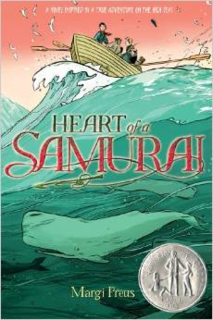 W
WHeart of a Samurai is a 2010 young adult historical novel by American author Margi Preus. The novel is closely based on the true story of Manjiro Nakahama (1827–1898) and is illustrated by his drawings, with jacket illustration by Jillian Tamaki. Heart of a Samurai has received numerous awards and honors, including being named as a Newbery Medal Honor Book in 2011.
 W
WThe Kite Runner is the first novel by Afghan-American author Khaled Hosseini. Published in 2003 by Riverhead Books, it tells the story of Amir, a young boy from the Wazir Akbar Khan district of Kabul. The story is set against a backdrop of tumultuous events, from the fall of Afghanistan's monarchy through the Soviet military intervention, the exodus of refugees to Pakistan and the United States, and the rise of the Taliban regime.
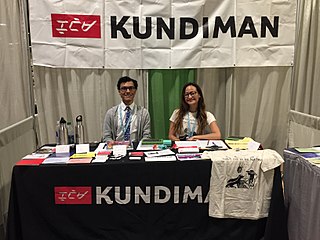 W
WKundiman is a nonprofit organization dedicated to nurturing generations of writers and readers of Asian American literature. The organization offers an annual writing retreat, readings, workshops, a mentorship program, and a poetry prize, and aims to provide "a safe yet rigorous space where Asian American poets can explore, through art, the unique challenges that face the new and ever changing diaspora." Kundiman was co-founded in 2004 by Asian American poets Sarah Gambito and Joseph O. Legaspi, and has received support from the National Endowment for the Arts, Philippine American Writers, PAWA, and individuals.
 W
WLipstick Jihad: A Memoir of Growing Up Iranian in America and American in Iran (ISBN 1-58648-193-2) is Iranian-American writer Azadeh Moaveni's first book, published on February 4, 2005.
 W
WReading Lolita in Tehran: A Memoir in Books is a book by Iranian author and professor Azar Nafisi. Published in 2003, it was on the New York Times bestseller list for over one hundred weeks and has been translated into 32 languages
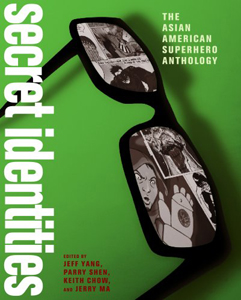 W
WSecret Identities: The Asian American Superhero Anthology is a comics anthology edited by Jeff Yang, Parry Shen, Keith Chow, and Jerry Ma that brings together leading Asian American creators in the comics industry—including Gene Yang, Bernard Chang, Greg Pak (Hulk), and Christine Norrie —to craft original graphical short stories set in a compelling "shadow history" of our country: from the building of the railroads to the Japanese American internment, the Vietnam airlift, the murder of Vincent Chin, and the incarceration of Wen Ho Lee.
 W
WWhen Heaven and Earth Changed Places is a 1989 memoir by Le Ly Hayslip about her childhood during the Vietnam War, her escape to the United States, and her return to visit Vietnam 16 years later. The Oliver Stone film Heaven & Earth was based on the memoir.
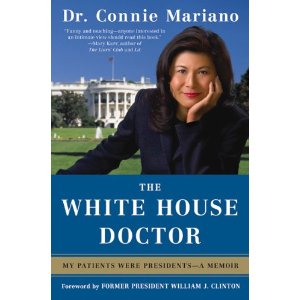 W
WThe White House Doctor: My Patients Were Presidents – A Memoir is a book authored by Connie Mariano, the first military woman in the history of the United States to be appointed as Physician to the President, the first female director of the medical unit of the White House, and the first Filipino-American to become a rear admiral in the US Navy. With a foreword from Bill Clinton, the autobiographical book takes a look at the personal lives of three American Presidents and three American First Ladies she had taken care of while working as a White House physician. It was described as a "fascinating look into what goes on behind closed doors at 1600 Pennsylvania Avenue".